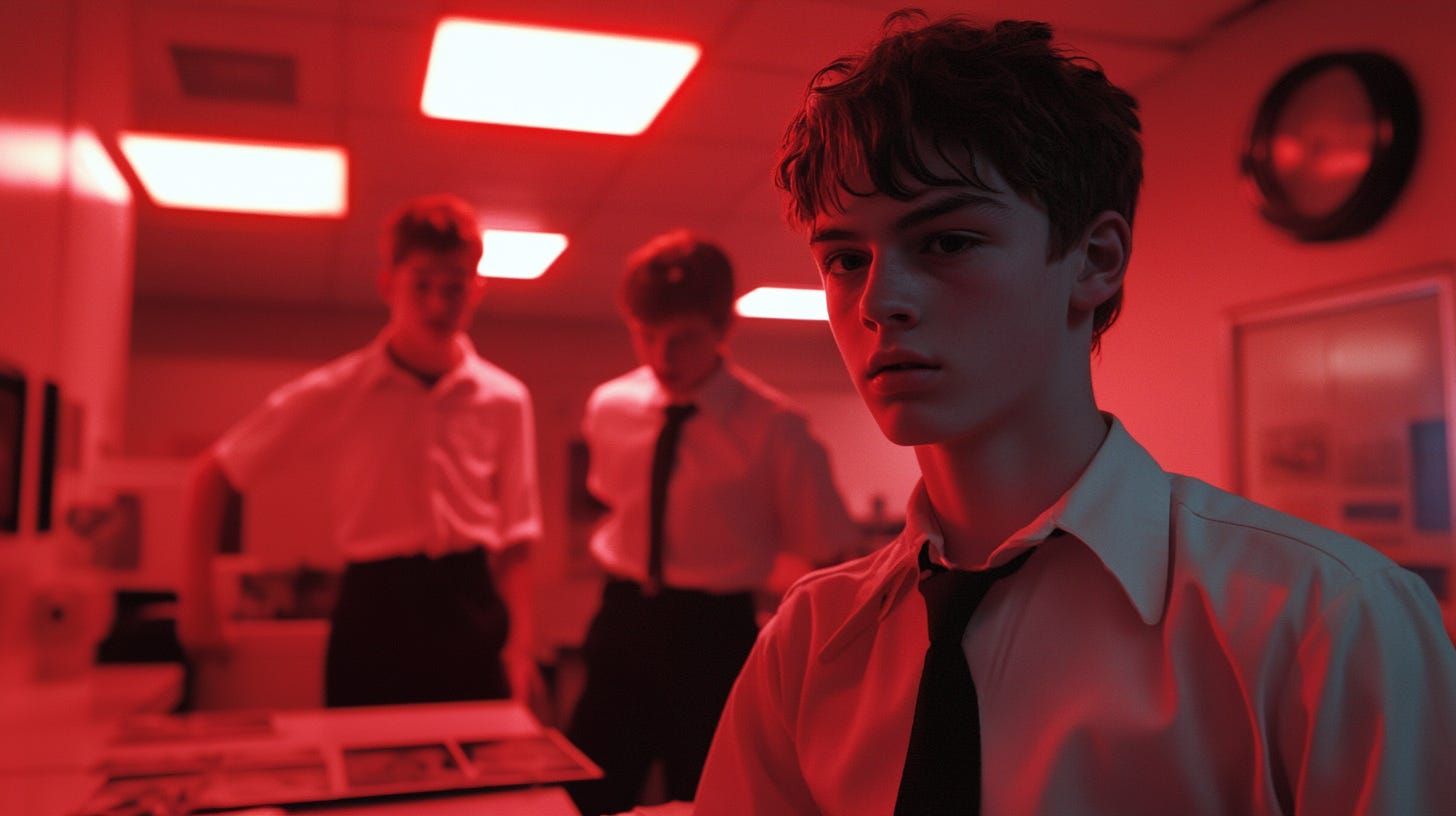Flashback Friday began as a way to revisit old essays or poems with a looser grip—sometimes to revise, sometimes to release.
The first version of this piece, No Need to Put on That Red Light, was written in 2021.
It still makes me laugh. It still makes me wince. It was, in some ways, about letting go of resentment.
But memory doesn’t always loosen its hold.
Some stories return not to be retold, but to ask different questions.
Not just what happened?
But what did we learn? What was revealed—not about school or scandal, but about power, visibility, silence?
This isn’t a correction.
It’s a reexposure.
A story, still developing.
Held Up to the Light
1. The System Was Supposed to Be Fixed
When Derbyshire scrapped the 11-plus, they promised equity.
No more grammar school elite.
No more academic caste system.
We became a comprehensive in name, but not in culture.
Same walls. Same teachers. Same second-class feeling.
Different name on the letterhead.
The myth was that all of us now had access.
The truth was that some doors stayed locked
and others swung open into chaos.
You could pick Science, but no one told you
if the curriculum would match your next school.
We were promised access.
What we got was guesswork.
2. Physics by Way of Football Boots
I picked Physics to follow my brothers’ footsteps.
Both had studied it at the University of London.
It felt like walking into the snow
where someone else had already cleared a path.
The Head of Science made it an easy choice.
He lit up the subject—until he got his Open University degree,
landed a new job, and left halfway through the year.
The headmaster filled the gap with a biology hire no one asked for,
and handed Physics to a games teacher
whose qualifications began and ended with owning a camera.
He explained this to me
in the library of a rival school,
right after I’d demolished their chess captain in an easy win.
He was feeling pleased with himself.
And, apparently, with me.
He liked optics.
He liked us liking optics.
And soon, we liked photography
more than we liked anything else in school.
3. The Dark Room
The darkroom sat between the labs.
No one told us it was off-limits.
No one locked the drawers.
In fact, we had his blessing.
He showed us how to load the 35mm cameras
with black-and-white film,
encouraged us to shoot freely,
and said we could develop everything ourselves—
so long as we didn’t waste materials.
We were curious.
We were fifteen.
One day, while we waited for our turn in the developer tray,
someone pulled a strip from a drawer
and held it up to the overhead light.
“There’s a nude woman on here.”
It took a second for the words to register.
Then everything came into focus.
A 35mm strip—just an inch and a half wide—
held more consequence than we could see at first.
We knew.
And we knew we shouldn’t know.
4. Exposure
We paused.
Held the moment like breath in our throats.
The silence had weight.
Then someone said he wanted a copy.
Another added, “Let’s make enlargements.”
Still, we hesitated—just long enough to know
this wasn’t harmless.
And then it all moved too fast.
Like it always does when curiosity gets mistaken for permission.
We made prints.
A lot of them.
A production line formed—fast, frantic, focused.
Dripping sheets.
Chemical trays.
The hum of the dryer warming to a backlog.
No class had ever lit us up like that.
It wasn’t the lesson we needed—
but it was the one we got.
5. Caught in the Red
We’d printed 25, maybe 30 enlargements.
But only two would fit in the dryer at a time.
The rest—wet and curling—lined the counters,
dripped from hangers,
piled like contraband.
When the knock came, we hit the switch.
Red light. Red bulb. Red hands.
The room glowed dim and guilty.
The negatives went back in drawers.
Dry prints into bags.
Scraps stuffed into pockets.
Wet prints under sweaters—clammy against our ribs.
“Let me in, lads.”
We stalled.
“We’re just developing, sir.”
The lie dropped faster than our heart rates.
The next day, he sent me to fetch something—
and followed.
Caught me by the lapels.
And bounced me off the corridor wall.
“You are banned from photography.
Banned from the darkroom.
Banned from being in the science block outside of lessons.
You’re lucky I don’t kick you out of class.
Now get out of my sight.”
His face was red.
Mine, I think, went cold.
I remember the chill of the wall
more than anything he said.
We had all been caught.
But I had been held up to the light.
6. What We Learned in the Darkroom
That exposure is permanent.
That institutions forgive carelessness in adults
but not curiosity in children.
That if you're noticed once—for the wrong reason—
you stay noticed.
But also this:
Somewhere in the silence after the slam,
something else developed.
I still speak when silence would be safer.
Still step forward when fairness is out of reach.
I know what it costs to be on the radar.
Maybe that’s where I learned
that visibility is rarely neutral.
And still I choose it.
Some prints dry slowly.
Some moments never stop developing.
Some screwups really do belong in a silent film.
And the red light?
It never really turned off.



Love your idea of this Friday review … not for a fix type revision but for a more evolved reflection. 👏🏼👏🏼👏🏼 Something AI will never be able to do.
1970s/1980s northern comprehensives were tough!! I always thought if I ever forget to prison I’ve had a good grounding. Great writing.